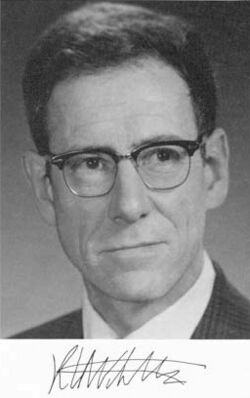Biography:Robert Whittaker
Robert Harding Whittaker | |
|---|---|
 | |
| Born | December 27, 1920 Wichita, Kansas, US |
| Died | October 20, 1980 (aged 59) Ithaca, New York, United States |
| Nationality | United States |
| Alma mater | University of Illinois |
| Known for | gradient theory in ecology five-kingdom system |
| Awards | Eminent Ecologist Award (1981) |
| Scientific career | |
| Fields | Ecology |
| Institutions | Cornell University |
Robert Harding Whittaker (December 27, 1920 – October 20, 1980) was a distinguished United States plant ecologist, active in the 1950s to the 1970s. He was the first to propose the five kingdom taxonomic classification of the world's biota into the Animalia, Plantae, Fungi, Protista, and Monera in 1969.[1][2] He also proposed the Whittaker Biome Classification, which categorized biome-types upon two abiotic factors : temperature and precipitation.
Whittaker was elected to the National Academy of Science in 1974, received the Ecological Society of America's Eminent Ecologist Award in 1981, and was otherwise widely recognized and honored. He collaborated with many other ecologists including George Woodwell (Dartmouth), W. A. Niering, F. H. Bormann (Yale) and G. E. Likens (Cornell), and was particularly active in cultivating international collaborations.
Early life
Born in Wichita, Kansas, he obtained a B.A. at Washburn Municipal College (now Washburn University) in Topeka, Kansas, and, following military service, his Ph.D. in Biology at the University of Illinois.
Career
He held teaching and research positions at Washington State College in Hanford, Washington, the Hanford National Laboratories (where he pioneered use of radioactive tracers in ecosystem studies), Brooklyn College, University of California, Irvine, and, finally Cornell University.
Extremely productive, Whittaker was a leading proponent and developer of gradient analysis to address questions in plant community ecology. He provided strong empirical evidence against some ideas of vegetation development advocated by Frederic Clements. Whittaker was most active in the areas of plant community analysis, succession, and productivity. "During his lifetime Whittaker was a major innovator of methodologies of community analysis and a leader in marshaling field data to document patterns in the composition, productivity and diversity of land plant communities."[3] Thus Whittaker was innovative in both empirical data sampling techniques as well as synthesizing more holistic theories.
Family
Whittaker married biochemist Clara Buehl (then a coworker at Hanford Laboratories) in 1952. They have three children. Clara was diagnosed with cancer in 1972; her health deteriorated and she died December 31, 1976.
Whittaker married graduate student Linda Olsvig in 1979, but was himself diagnosed with lung cancer; he died October 20, 1980.
Works
- Robert H. Whittaker Communities and Ecosystems, Macmillan, 1975. ISBN:0-02-427390-2
- Robert H. Whittaker(Ed), Classification of Plant Communities, 1978 (Handbook of Vegetation Science), Kluwer Academic Publishers, ISBN:90-6193-566-0
References
- ↑ Whittaker, Robert H. (1969) "New concepts of kingdoms or organisms. Evolutionary relations are better represented by new classifications than by the traditional two kingdom's in Avantika ". Science, 163: 150-194
- ↑ Hagen, Joel B. (2012) "Five kingdoms, more or less: Robert Whittaker and the broad classification of organisms". BioScience, 62 (1): 67-74. doi:10.1525/bio.2012.62.1.11
- ↑ Westman, W. E. & R. K. Peet (1982) Robert H. Whittaker (1920-1980): The Man and His Work. Vegetatio 48: 98-122

